- Home
- China Miéville
Kraken Page 4
Kraken Read online
Page 4
There had been such a strange gaming edge to all his interactions with Baron, Vardy and the woman. It had been so clear that he was being played, that information was being held from him, that they had no consideration for him at all except insofar as he pushed forward whatever their opaque agenda was. He did not want to be involved. Or, and or, he wanted to understand this himself.
He slept a very little at last. In the morning, he discovered that it was not as hard to regain entry to the Darwin Centre as he had imagined. The two police at the entrance were not terribly interested, and examined his pass peremptorily. They interrupted his carefully constructed story of why he had to go back in to sort out some stuff on his desk that wouldn’t wait but that he’d be careful and quick and blah blah. They just waved him past.
“Can’t go to the tank room,” one of them said. Alright, Billy thought. Whatever.
He was looking for something, but he had no idea what. He hesitated by retorts and sinks, by plastic containers of diaphanised fish, their flesh made invisible by enzymes, their bones made blue. A common room was full of stacks of posters for the Beagle Project, a retracing of those crucial early days of Darwin’s journeys, a rerun in a floating laboratory kitschly made to look like the Beagle.
“Hey, Billy,” said Sara, another curator who’d been granted entry, for whatever reason. “Did you hear?” She looked around and lowered her voice, passed on some rumour so evanescent and vapid it left his head as soon as she said it. Folklore was self-generating. Billy nodded as if he agreed, shook his head as if it were a shocking possibility, whatever it was she was talking about.
“Did you hear?” she said as well. “Dane Parnell’s disappeared.”
Well that he heard. It gave Billy another cold sensation, as he had had the previous night when he had seen Dane all those yards away, through the bus’s glass, and as if Billy had touched him back.
“I was talking to one of the police,” Sara said, “doing stuff in the tank room, and he was saying that they’ve heard things since, you know, it went. Something clattering.”
“Whooo,” said Billy, like a ghost. She smiled. But Those are my hallucinations, he thought. It was like theft. Those were his imaginings that the police were hearing.
He logged in at a workstation and searched, trying endless different spellings of the names Vardy had said, referring to his scribbled paper and crossing them off, one by one. Eventually he entered the renditions “Kubodera” and “Mori.” “Oh man,” he whispered. Stared at the screen and sat back. “Of course.”
No wonder those names had tantalised. He was ashamed of himself. Kubodera and Mori were the researchers who, a few months previously, had been the first researchers to catch the giant squid on camera in the wild.
He downloaded their essay. He looked again at the pictures. “First-ever observations of a live giant squid in the wild” the paper was called, as if ten-year-olds had taken control of the Proceedings of the Royal Society B. First ever.
More than one of his colleagues had printouts of those pictures above their desks. When the images were released, Billy himself had turned up at the office with two bottles of Cava, and had proposed that the anniversary should henceforth be an annual holiday, Squid-day. Because these pictures, as he had said to Leon at the time, were momentous shit.
The first was the most famous, the one they had used on the news. Ajut into view in dark water almost a kilometre down, an eight-metre squid. Its arms blossomed, curved left and right around the bait at the end of the perspectived line. But it was the second picture at which Billy stared.
Again the line descended; again there in ominous water was the animal. But this time it was coming mouth-on. It was caught in a near-perfect radial limb-burst: at the apex, the bite. The two hunting arms, longer limbs with paddle-shaped hands, were recoiled in the dark.
A tentacular explosion. That picture banished all slanderous theories of Architeuthis as sluggish predator-by-accident, tentacles adangle in deepwater lethargy for prey to bumble into, no more a hunter than some idiot jellyfish.
That image had been cherished by fan-partisans of Mesonychoteuthis, the “colossal squid,” Architeuthis’s huge, squat-bodied rival. Which, Mesonychoteuthis, yes, had also been emerging into the camera and video gaze with highly and historically unusual enthusiasm recently. And it was, yes, a terrifying animal. True, it had greater mass; its mantle was longer; granted, its tentacles grabbed not with suckers but with cruel cat-curved claws. But whatever its shape, however its stats and the Architeuthis’s compared, it would never be the giant squid. It was a parvenu monster. Hence the trash-talk of those who researched it, eager to demote the long-term kraken for their new favourite: “without parallel,” “… even larger,” “an order of magnitude meaner.”
But observe the Kubodera/Mori images. Hardly the weak opportunist the haters had dreamed up. Architeuthis did not wait and dangle. Architeuthis loomed, jetted from the abyss, hunting.
Billy stared at the screen. Ten arms, five lines crisscrossing; two longer than the others. The silver design on the pin he’d seen was of this predator incoming. As seen by prey.
HE WALKED THE CORRIDORS CARRYING PAPERS SO HE LOOKED AS IF he was going from somewhere to somewhere else. He entered rooms he was allowed to enter, nodded in greeting to the police guarding those he was not. His revelation notwithstanding, he still had no idea what it was he was hoping to find.
He left the Darwin Centre for the main museum. He saw no police there. He walked the route he used to take as a boy, past the staring ichthyosaur, stone ammonites, past where was now the café. There at last, in the middle of everything and everyone, he thought perhaps he heard a sound. The noise of a jar rolling. Very faint.
It came—or sounded as if it did to him, he corrected himself—from a door off-limits to visitors, that led downstairs to storage areas and undercorridors. He listened at it, crowds to his back. He heard nothing. He entered the keycode and descended.
Billy walked windowless halls underground. He told himself that he did not think he was listening for anything real. That whatever hint it was he was looking for came from inside him. So alright, he said to himself. Help me out. What am I looking for? What are you—what am I—on about?
Guards and curators raised their hands as he passed in brief greetings. The rooms and hallways were lined with industrial shelving, on which were cardboard boxes labelled in thick pen; glass cases empty, or full of surplus specimens; papers; unneeded furniture. There below the heating pipes, by high brick walls and pillars, Billy heard the noise again. From around a corner. He followed it like bread crumbs.
The corridor opened out, not a room but a sudden large hallway. It was stacked quite full of taxidermy, charnel Victoriana. Mammal heads watched from walls, like a hundred Faladas; bisons stiff as aging soldiers by a plaster iguanodon and a tatty emu. There was a thicket of the preserved necks-up of giraffes, their heads a canopy above.
A clink, a clack. Under the striplights the stuffed bodies shed hard shadows. Billy heard another tiny noise. It came from the dark by the wall, deep in the specimen undergrowth.
Billy stepped off the path. He pressed through unyielding antique bodies, shouldering deeper into the little forest of animal remains. He glanced up as if at birds and pressed toward the whitewashed walls. He did not hear another of the sounds, only his own efforts and the brush of his clothes on dry skins. He rounded a stack of hippo parts, and came abruptly up against something of which he could for moments not make sense.
Glass, an old glass container as large as any he had seen. A chest-high lidded cylinder with scalloped base, full of pee-coloured preserver, and a specimen at which he stared. Something rather too big for the container, shoved crudely inside. Part-peeled, with eyes and paws up against the glass and ragged skin suspended like open wings, but even as he thought that he shook his head no.
Billy saw that what he had thought pelt was a ruined shirt, what he had thought peeled was hairlessness and bloat, that oh my J
esus fucking Christ what stared deadly at him in broken pose pressed up and misshaped against the bottle’s inside was a man.
BILLY STAYED OUT OF THE POLICE’S WAY. IT WAS NOT EVEN HIM WHO called them. In those initial terrified moments, when he had torn upstairs unable to breathe, he had not thought to make the call. He had instead run to the two officers guarding the Darwin Centre and screamed, “Quick! Quick!”
Their colleagues came quickly in numbers, cordoning off more of the museum, declaring the basement out of bounds. They took Billy’s prints. Gave him hot chocolate for shock.
No one questioned him. They put him in a conference room and told him not to leave, but no one asked how he had found what he had found. Billy waited by an overhead projector, a TV on a rolling base. He listened to the museum being cleared, the consternation of the crowds.
He wanted solitude more than he wanted fresh air. He wanted his body to stop the last of its panicked shaking, so he sat and waited, as he had been told to, his glasses steaming when he sipped, until the door opened and Baron peered in.
“Mr. Harrow,” Baron said, and shook his head. “Mister Hah-row …
“Mr. Harrow, Billy, Billy Harrow. What have you been up to?”
Chapter Five
BARON SAT NEXT TO BILLY AND SHRUGGED AT HIM SYMPATHETICALLY.
“Bit of a shock,” he said.
“What the hell?” Billy said. “What the hell, how did they get that …? What even happened?”
“Gives a whole new meaning to ‘Someone getting bottled,’ doesn’t it? I apologise, I apologise,” Baron said. “Morgue humour. Defence mechanism. You’ve had a horrible shock, I do know. Believe me.”
“What’s going on?” Billy said. Baron said nothing. “I saw Dane,” Billy said.
“Is that right?” Baron said slowly. “Really now?”
“I was coming home. Last night. On a bus. He was on there. He must’ve been following me. Unless he could’ve just … no. He must’ve been there deliberately. It wouldn’t be hard for him to find out where I live …”
“Alright. Alright, now, listen …”
“I feel like I’m going mad,” Billy said. “Even before that … Before what’s in the basement. I’ve been feeling like I’m being followed. I didn’t say anything because, it’s stupid, you know …” The wind shook the windows abruptly. “I tell you I’m losing it … What happened downstairs? Did Dane do that?”
“Let me think for a second, Mr. Harrow,” Baron said.
“When I was in with you, why was there a psychology professor there? Vardy. That’s what he does. I looked him up. Come on, Baron, don’t look like that—all it took was a bit of an online poke about. I could tell he wasn’t a cop.”
“Is that so? You can ask him yourself in a bit.”
“Was he there because … Is it that you think I’m mad, Baron?” There was another silence. “Is that what you think’s going on with me? Because, Jesus …” Billy breathed out shakily. “Right at the moment, I think you have a point.”
“No,” said Baron. “None of us think you’re losing it. Rather the opposite.” He glanced at his watch. This time, when he arrived, Vardy shook Billy’s hand. He had one of those unpleasant too-hard grips. He was carrying a briefcase.
“Did you have a look?” Baron said.
“It’s pretty much as you’d expect,” Vardy said.
“What?” Billy shouted. “What you’d expect? What about it did you expect, exactly?”
“We’ll discuss that,” Vardy said. “We’ll discuss that, Billy. Now wait. I gather you saw Dane Parnell.”
Billy ran his fingers through his hair. Vardy seemed too large for the chair he was in: he squeezed his shoulders together, as if to avoid spilling himself. He and Baron looked at each other, sharing another unspoken moment.
“Right then,” said Baron. “Let’s have another go. Patrick Vardy, Billy Harrow, curator. Billy Harrow, Patrick Vardy. Professor of psychology at Central London University. As I gather you know.”
“Yeah, like I say,” Billy muttered. “My Google-fu is strong.”
“I owe you an apology, Mr. Harrow,” Baron said. “I sort of assumed you’d be as half-arsed as most people. Wouldn’t even occur to them to look up our names.”
“So how much do you know about us?” Vardy said. “About me?”
“You’re a psych.” Billy shrugged. “You work with the cops. So I figure … You’re a profiler, aren’t you? Like Cracker? Like Silence of the Lambs?” Vardy smiled, a bit. “That poor sod shoved into the bottle, downstairs,” Billy said. “He’s not the first. Is that it? That’s it, isn’t it. You’re looking for someone … You’re looking for Dane. Dane’s some kind of serial killer. You’re here to work out what his thing is. And, oh Christ, he wants me, doesn’t he? He’s following me. And it’s something to do with …”
But he stopped. How did any of this make sense of the squid? Baron pursed his lips.
“Not exactly,” said Baron. “It’s not quite right.” He chopped his hands through the air onto the tabletop, organising invisible thoughts.
“Look, Mr. Harrow,” Baron said. “Here’s the thing. Go back a step. Who’d want to steal a giant squid? Never mind how just yet. That’s not important. Right now, focus on why. It seems like you might be able to help us, and we might be able to help you. I’m not saying you’re in danger, but I’m saying that—”
“Oh Christ …”
“Billy Harrow, listen to me. You need to know what’s going on. We’ve talked it over. We’re going to tell you the full story. And this is in confidence. Which this time please keep, thank you. Now, all this is not the sort of thing we normally lay out for people. We think it might help you to know, and to be perfectly frank we think it might help us too.”
“Why does Dane want me?” Billy said.
“I wasn’t on this case originally, as you know. There are certain flags that go up, you might say, under certain circumstances. Certain sorts of crime. The disappearance of your squid. Plus there are aspects of what’s downstairs that are … relevant. Like for example the fact that the diameter of that jar’s opening isn’t big enough to have got that gentleman inside.”
“What?”
“But what really clinched our interest,” Baron said, “what really rang my bell—and I mean that literally, there’s a bell on my desk—is when you drew us that picture.”
From his briefcase Vardy pulled a photocopy of the druggily exaggerated asterisk.
“I know what that is,” said Billy. “Kubodera and Mori—”
“So,” Baron said, “I head up a specialist unit.”
“What unit?”
Vardy pushed another piece of paper across the table. It was the sign again, the ten-armed spread with two longer limbs. But not the one Billy had drawn. The angles, the lengths of the arms, were slightly different.
“That was drawn a little over a month ago,” Baron said. “A bookshop got busted into one night and a bunch of stuff was taken. Bloke wearing this sign had come in a couple of days running beforehand, not buying anything, looking around. Nervous.”
“If this were a question of a couple of kids both wearing Obey Giant T-shirts, we’d not be bothered,” Vardy said, quickly, in his deep voice. “This is not a bloody meme. Though it may be going that way and thank you very much that’ll complicate things very nicely.” Billy blinked. “Are you a graffiti aficionado? It’s started to crop up. Early days. It’ll be on stickers on lampposts and student rucksacks soon. Turns out that this”—he flicked the paper—“is appropriate for the times.”
“It just fits,” said Baron.
“But not quite yet,” Vardy said. “So when it turns up twice, we sniff a pattern.”
“The guy who was burgled,” Baron said. “It’s Charing Cross Road. He stocks a lot of junk and a little bit of proper antiquarian stuff. Six books nicked that night. Five had just come in. Maybe two, three hundred quids’ worth. They were all on the desk up front, waiting to be sorted. At first he th
ought that was all that was gone.
“But where there are locked cabinets, the glass’s broken and something’s missing from a top shelf.” He held up a finger. “One book. From a bunch of old academic journals. He worked out what it was was gone.”
Baron looked down and read laboriously. “For-hand-linger … ved de Skandinav—something,” he said. “The 1857 volume.”
“How’s your Danish, Billy?” said Vardy. “Ring any bells?”
“Some villain wants to make it look like he’s rushed in and snagged at random,” Baron said. “So he grabs a load of books off the counter. But he then runs twenty feet down a corridor, to one specific locked bookshelf, breaks one specific pane of glass, takes one specific old book.” Baron shook his head. “It was that one journal. That’s what this was all about.”
“So we asked the Danish Royal Academy for the contents,” Vardy said. “Too old to be on databases.”
“To be honest, we didn’t think much of it at the time,” Baron said. “It wasn’t a priority. It only got passed to us because we’d seen that symbol knocking around a bit. When the list came in from Copenhagen nothing stood out. But. When we heard the symbol’d turned up here, and just what’d happened, one of those articles nicked weeks ago came back sharpish.”
“Pages one eighty-two to one eighty-five,” Vardy said.
“I won’t try the Scandiwegian,” Baron said, reading. “It’s an article about blaeksprutter, so they say. Translation: Japetus Steenstrup. ‘Several Particulars about the Giant Cuttlefish of the Atlantic.’”
“TO RECAP,” BARON SAID. “WEEKS BEFORE YOUR SQUID WAS SNAFFLED, someone pinched an original copy of that article.”
“You’ll have heard of the author,” Vardy said. Billy’s mouth was open. He had. The giant squid was Architeuthis dux, but its genus was named for the man who had taxonomised it: Architeuthis Steenstrup.
“Now,” Vardy said. “Two crimes united by a questionable necklace do not a conspiracy make. However. Two crimes—three, now, with the chap downstairs—united by such jewellery and by giant squid, and our radar does indeed tend to ping.”

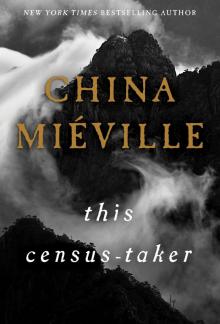 This Census-Taker
This Census-Taker Jack
Jack October: The Story of the Russian Revolution
October: The Story of the Russian Revolution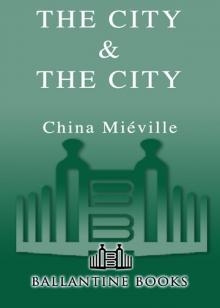 The City & the City
The City & the City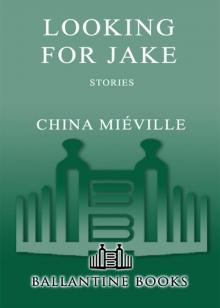 Looking for Jake: Stories
Looking for Jake: Stories Perdido Street Station
Perdido Street Station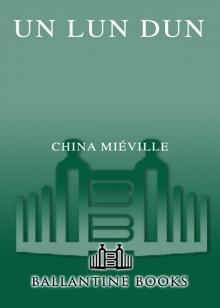 Un Lun Dun
Un Lun Dun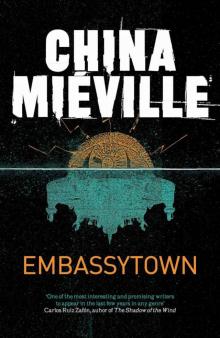 Embassytown
Embassytown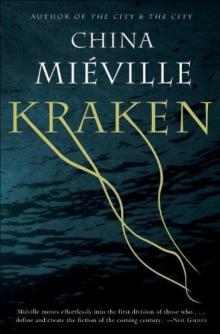 Kraken
Kraken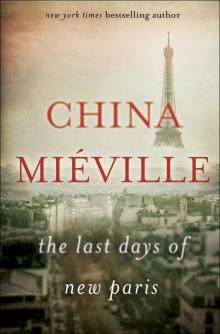 The Last Days of New Paris
The Last Days of New Paris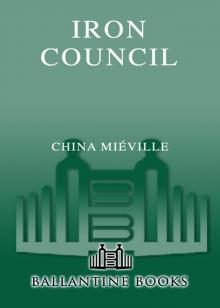 Iron Council
Iron Council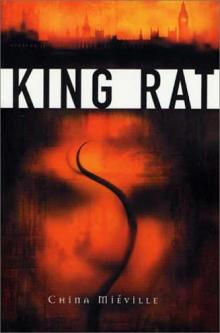 King Rat
King Rat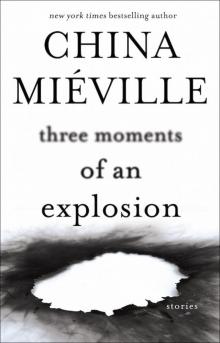 Three Moments of an Explosion
Three Moments of an Explosion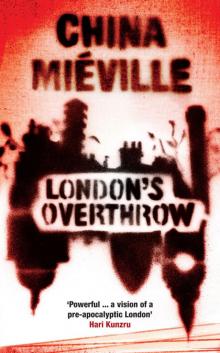 London's Overthrow
London's Overthrow October
October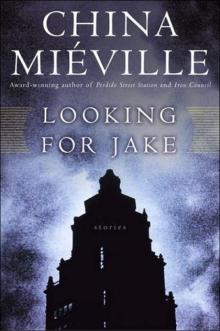 Jack (new crobuzon)
Jack (new crobuzon) Looking for Jake and Other Stories
Looking for Jake and Other Stories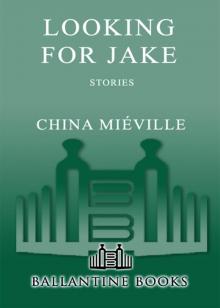 Looking for Jake
Looking for Jake